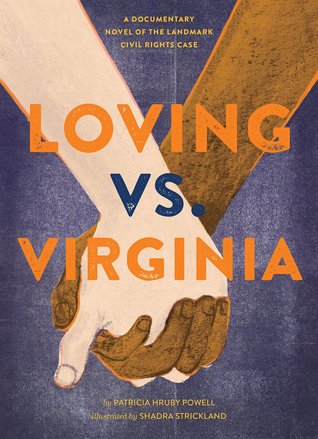
Powell, Patricia Hruby and Strickland, Shadra (illustrator)
Loving Vs. Virginia
January 31st 2017 by Chronicle Books
Copy provided by the publisher
This well-illustrated and photography filled novel in verse dramatizes the events of Mildred Jeter and Richard Loving's relationship in Virginia in the 1950s and 60s. Young readers of today will probably be surprised that the couple faced so many challenges, like being stalked by the local police officer who even came into their house to arrest them because they, as a married couple, were in bed together. This gives a very vivid reminder about how different things were before the Civil Rights movement effected changes.
The information is presented in a middle grade friendly way, even though there are some topics that are a bit sensitive, such as Jeter becoming pregnant twice while still in high school. I'm not a fan of novels in verse, although in this case it was fairly successful because it provided a distance that was a nice touch to use in dramatizing a real life story. The illustrations are quite nice, and Strickland clearly researched techniques used during this time period. The supplemental information about conditions at the time, as well as the period photographs, make this a great resource.
And, of course, without Loving vs. Virginia, the following book wouldn't be possible!

Donoghue, Emma. The Lotterys Plus One
March 27th 2017 by Arthur A. Levine Books
E ARC from Edelweiss Above the Treeline
The Lottery family was formed by PopCorn, who is from a Scottish family in the Yukon and who is partnered with PapaDum, who is from India, and Jamaican MaxiMum, and CardaMom, who is a member of the Mohawk tribe. When the oldest child was born, all four friends were at the hospital and found a lottery ticket. When it ended up winning, they all quit their jobs to live an ecofriendly life in a 32 room house where they adopted a multicultural group of children and home schooled them. They changed their family name to Lottery, and the house is called Camelottery. When PopCorn's elderly father almost burns down his house, he comes to live with the family on a trial basis, taking over fifth child Sumac's room. She becomes "Grumps" guide, and tries to understand the man who has not been in contact with the family and seems biased against people who don't look just like him. The family has outings, studies different topics, and Sumac tries to introduce her grandfather to their neighborhood and tries to understand what motivates him. This understanding turns out to be very helpful to her parents, who think that Grumps needs the care that a nursing home could provide.
Strengths: This was certainly a very diverse book. Even three year old Briar has decided that she is really Brian, although the family does still use feminine pronouns for her. The family is also eco friendly ("way too green to have a car, because it messes up the planet"), eats locally, and are always present and supportive of each other. It's sort of like a Millennial, hipster version of Cheaper by the Dozen.
Weaknesses: The foreword mentions that children all like to imagine themselves part of large families, like The Brady Bunch, and that the Lotterys are like that, but also welcoming and inclusive of all manner of differences. This is true, but this book falls on the elementary side of the Pilkey line for me. There are so many odd things in the book (the back porch is called the Derriere, because it's the "butt" of the house) that it's hard to take it seriously, and there are so many different kinds of diversity piled on top of each other that it feels gimmicky. Middle school readers will find it too goofy to be believable, but elementary students might like it.
What I really think: I thought about this one for a long time. On the one hand, it's fairly humorous and lighthearted. On the other, it's not going to help middle grade students understand diversity. The Family Fletcher is a more realistic example of a diverse family. It is headed by two fathers, and they have adopted a variety of children. The situations are more in line with what many children experience. I wish that The Lotterys hadn't employed the twee names (all of the children are trees) or so many alternative lifestyle choices (not having a car, not flushing the toilet, etc.). If there had been fewer children or a more mainstream lifestyle with the diverse parents, it would have felt more realistic. There's not much of a plot, ala Wimpy Kid, or perhaps the plot of settling the grandfather into the family is sort of lost in the barrage of anecdotes, quirks, and pet rats. Perhaps this is an outcome of an adult author trying to transition to a middle grade book and trying a little too hard.
I really wanted to like this, but I'm not sure that reading this book will make my students more open to people whose lives are different from their own. I much prefer Gennari's My Mixed-Up, Berry Blue Summer, the aforementioned The Family Fletcher books, and Ignatow's Popularity Papers. I am curious to see what others think of this one.

























No comments:
Post a Comment